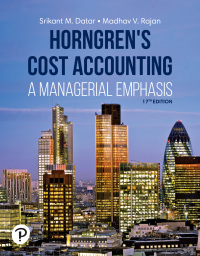Question
A Company is considering the purchase of a new machine. Its invoice price is $250,000, freight charges are estimated to be $9,000, and installation costs
A Company is considering the purchase of a new machine. Its invoice price is $250,000, freight
charges are estimated to be $9,000, and installation costs are expected to be $6,000. Salvage value of
the new machine is expected to be zero after a useful life of 4 years. Existing equipment could be
retained and used for an additional 4 years if the new machine is not purchased. At that time, the
salvage value of the equipment would be zero. If the new machine is purchased now, the existing
machine would be scrapped.
The accountant, has accumulated the following data regarding annual sales and expenses with and without the new machine.
Without the new machine, the company can sell 12,000 units of product annually at a per unit selling price of
$80. If the new unit is purchased, the number of units produced and sold would increase by 25%, and
the selling price would remain the same.
The new machine is faster than the old machine, and it is more efficient in its usage of materials. With
the old machine the gross profit rate will be 25% of sales, whereas the rate will be 35% of sales with the
new machine.
Annual selling expenses are $170,000 with the current equipment. Because the new equipment would
produce a greater number of units to be sold, annual selling expenses are expected to increase by 10% if
it is purchased.
Annual administrative expenses are expected to be $110,000 with the old machine, and with the new
machine the annual administrative expenses are expected to increase by 12%.
The current book value of the existing machine is $25,000. The company uses straightline depreciation.
The company's management has a required rate of return of 11% on its investment and a cash payback period
of less than 2 years.
Instructions
Show your calculations for the following question a, b and c.
a) Calculate the annual rate of return for the new machine. (Round to two decimals.)
b) Compute the cash payback period for the new machine. (Round to two decimals.)
c) Compute the net present value of the new machine. (Round to the nearest dollar.)
Step by Step Solution
There are 3 Steps involved in it
Step: 1

Get Instant Access to Expert-Tailored Solutions
See step-by-step solutions with expert insights and AI powered tools for academic success
Step: 2

Step: 3

Ace Your Homework with AI
Get the answers you need in no time with our AI-driven, step-by-step assistance
Get Started


